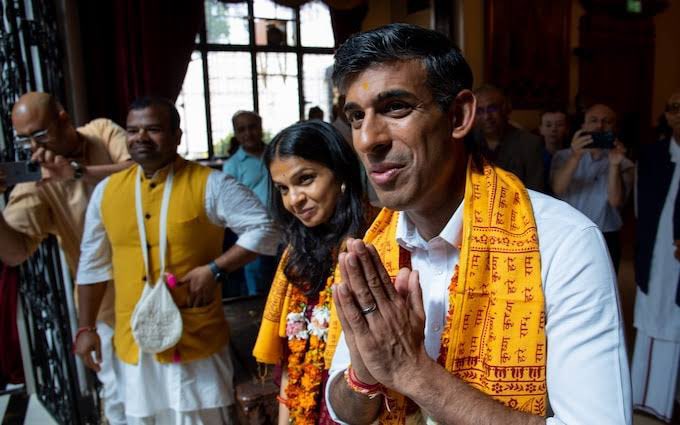by Aakriti Tandon and Michael O. Slobodchikoff
7 November 2022
For the United Kingdom, the festival of Diwali on October 24 was supposed to bring a free trade agreement with India. Instead, it brought a Prime Minister of Indian Origin, Rishi Sunak. Firsts are always exciting, and Rishi brings a lot of firsts. He is the first person of Indian origin, South Asian descent, and the first Hindu to serve as Prime Minister of the United Kingdom. He was the first PM to be appointed by King Charles III, having just take over the crown after the death of Queen Elizabeth II, the longest serving monarch in British history.
Queen Elizabeth’s funeral was watched with reverence and awe around the world. While the citizens of many Western nations watched with nostalgia and fondness, others in Africa, Asia and elsewhere were criticizing her role in maintaining the colonial legacy. Despite the belief in the importance of the Commonwealth (former British colonies), the long-reigning monarch never apologized for the horrors of colonialism. British colonialization was known for its brutality, discrimination, and injustice to native peoples in the colonies. The colonization of the Indian sub-continent was no different. One of the enduring legacies of colonization was the partition of British India into two independent states, India and Pakistan, which resulted in millions of deaths and displacements. It continues to be one of the largest man-made disasters, one that resulted in unending suffering for humanity. While the British monarch expressed sorrow about the negative impact of colonialism, she never offered a sincere, direct apology to the colonies. Her funeral celebrated the end of an era, one where powerful states did not apologize for their inhumane treatment of the vulnerable, one where they violated the human rights of citizens in other nations. This was also an era where powerful states refused to return the precious art, historical artifacts and wealth that they looted and forcefully extracted.
The appointment of Rishi Sunak as the Prime Minister of the United Kingdom heralds a new era. This is an era where India has just overtaken the United Kingdom as the world’s fifth largest economy. This is an era where BREXIT has resulted in reducing the UK’s prominence in international markets and influence in international affairs. This is also an era where Britain has been wooing India to form a free trade agreement which will result in increased bilateral investment and joint ventures as well as double bilateral trade to 100 billion by 2030. This new era is marked by an India that is rising and confident and wants to negotiate from a position of strength and fairness. India’s growing middle class makes it an attractive market for foreign companies.
As we discuss in our upcoming book, India as Kingmaker: Status Quo or Revisionist State, ties between India and the UK have been a missed opportunity. The number of treaties between the two countries remains extremely low, and the number of nested treaties is even lower. Neither state has worked to institutionalize their bilateral relationship. For comparison, India’s relationship with France or China is much more deeply institutionalized than its relationship with the UK. It is puzzling that India has developed deeper ties with China, which is an adversary, than with the country that it has modeled its parliamentary democracy after! The lack of development in Indo-British trade and ties can be partly explained by the lack of trust in the relationship. Britain has not unequivocally apologized for its actions, India has not forgiven nor forgotten its past, and the wounds of colonialism have yet to heal. The appointment of a person of Indian origin to the highest public office in the land can start to heal the relationship. Rishi Sunak’s appointment on the auspicious day of Diwali has been met with celebration in India and by Indians around the world. Monikers and memes abound! The tables have turned! From British Raj to Rishi Raj (Raj is Hindi for rule).
Rishi is the embodiment of the Indian immigrant class in Britain, which has long faced discrimination and racism. Rishi represents the modern immigrant – well educated, eloquent, intelligent, and rich! While congratulating Rishi Sunak on his appointment, Prime Minister Modi tweeted those Indian immigrants served as a living bridge between India and the UK. Today, many people of Indian origin serve in the British government. They have the potential to reshape the ties between their ancestral land and adopted homeland. In his first phone conversation with PM Modi, Sunak described himself as a “visual representation of the historic links between the UK and India”.
If India and the UK wish to upgrade their Strategic Partnership to a Comprehensive Strategic Partnership, they must make a conscious attempt to strengthen their relationship and efforts at cooperation. This must be accompanied by a transparent and honest conversation about historical mistakes and efforts made to right the wrong including the return of precious Indian art to India. This new era may enable the two states to chart a new course in Indo-British ties.

